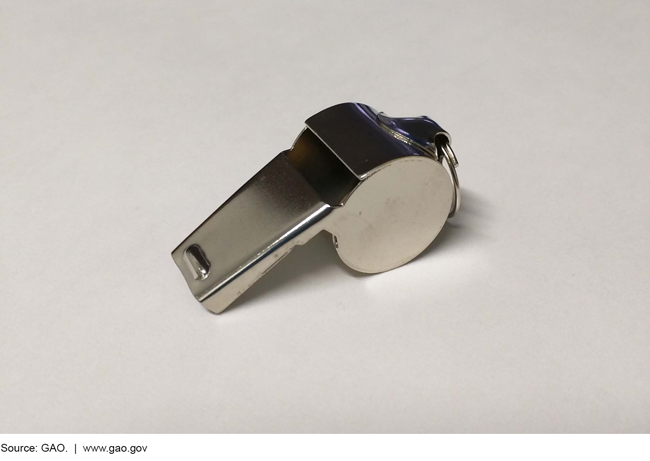Whistleblowers: Key Practices for Congress to Consider When Receiving and Referring Information
Fast Facts
Federal whistleblowers help guard the government against waste, fraud, and abuse by reporting potential wrongdoing. Whistleblowers can report to various federal offices, including Congress.
Because whistleblowers risk reprisal (such as being fired or reassigned), congressional offices need procedures to safeguard their information and identity. We identified key practices for congressional staff to consider when working with a whistleblower, such as:
Developing a secure tracking system to store information
Being transparent with whistleblowers about decisions and priorities
Asking permission before sharing personal information

A silver whistle
Highlights
What GAO Found
The Congress receives whistleblower information in multiple ways. Congressional staff and advocacy groups said whistleblowers who contact the Congress typically reach out to oversight committees, the offices of their own representatives or senators, or authorizing committees. Congressional staff said some whistleblowers contact and work with multiple congressional offices simultaneously. Congressional office websites GAO reviewed included contact information to provide whistleblowers with multiple options for reporting suspected wrongdoing, including email links, hotlines, and web-based forms.
Congressional staff can access resources for guidance on working with whistleblowers including congressional advice and internal training on oversight, committee-specific training related to handling whistleblower cases, and training from external advocacy groups on techniques for working with whistleblowers. Staff from several committees said direct experience is important for building skills to effectively work with whistleblowers.
GAO identified key practices the Congress could consider when receiving and referring whistleblower information to other committees and federal agencies. These practices can serve as a resource for congressional offices and staff to intake, prioritize, refer, and follow-up with whistleblowers who contact their office or committee. For each step, GAO identified practices to help offices develop guidelines and procedures as well as for communication, including key questions staff can ask the whistleblower.
Key Practices for Congressional Staff to Consider When Working with Federal Whistleblowers

Why GAO Did This Study
Federal whistleblowers—employees who report violations of law, agency mismanagement or ethical violations—help to safeguard the federal government against waste, fraud, and abuse. Whistleblowers can report to various entities, including the Congress. While these reports are a key source of information for federal oversight, whistleblowers can risk reprisal. Therefore, it is important to appropriately handle whistleblowers' information and identity.
The House Committee on Appropriations Report 115-696 included a provision for GAO to identify congressional avenues, resources, and best practices for working with whistleblowers. This report describes (1) how the Congress receives whistleblower information, (2) the policies and training currently available to congressional staff, and (3) key practices that the Congress could consider for receiving and referring information from whistleblowers. GAO interviewed congressional staff, officials from the Office of Special Counsel (OSC) and the Council of the Inspectors General on Integrity and Efficiency (CIGIE), and selected advocacy groups that have experience working with whistleblowers. GAO analyzed congressional websites and queried congressional staff regarding policies and training on whistleblowers for congressional staff. To develop key practices, GAO reviewed literature, existing procedures, and standards.
GAO is not making recommendations, but is available to assist the Congress with practices for working with whistleblowers. OSC and CIGIE provided technical comments that were incorporated as appropriate.
For more information, contact Michelle Sager at (202) 512-6806 or sagerm@gao.gov.
